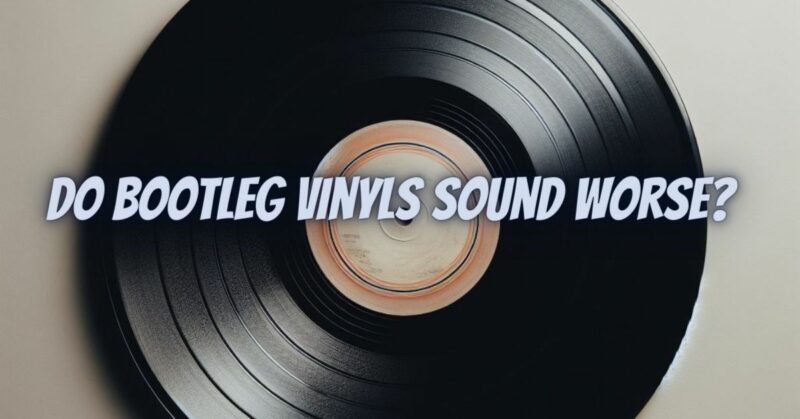Bootleg vinyls can sound worse than official releases for a number of reasons.
- Source material: Bootleggers often use low-quality source material, such as MP3s or live recordings. This can lead to a poorer sound quality on the bootleg record.
- Pressing quality: Bootleg records are often pressed on inferior quality vinyl using lower-quality equipment. This can lead to surface noise, distortion, and other problems.
- Mastering: Bootleg records are often not mastered professionally. This can lead to a number of problems, such as poor tonal balance, clipping, and other artifacts.
In addition, bootleg vinyls are often not made to the same specifications as official releases. For example, the grooves on bootleg records may be too narrow or too shallow, which can lead to tracking problems and skipping.
Here are some specific examples of how bootleg vinyls can sound worse than official releases:
- Surface noise: Bootleg records often have a lot of surface noise, such as pops, clicks, and crackle. This is because the vinyl used to press bootleg records is often of inferior quality and the pressing equipment is often not properly maintained.
- Distortion: Bootleg records can also suffer from distortion, which is a harsh, unpleasant sound that occurs when the audio signal is too loud. This is often caused by the bootlegger using a lower-quality pressing needle or by cutting the grooves on the record too deep.
- Clipping: Clipping is a type of distortion that occurs when the audio signal is too loud and the peaks of the waveform are flattened. This can cause the music to sound harsh and unpleasant. Bootleg vinyls are often clipped, especially if they were mastered poorly.
- Poor tonal balance: Bootleg vinyls often have a poor tonal balance, meaning that the bass, midrange, and treble frequencies are not properly balanced. This can lead to the music sounding muddled or lacking in detail.
- Tracking problems: Bootleg vinyls can also suffer from tracking problems, which is when the stylus of the turntable has trouble tracking the grooves on the record. This can cause the music to skip or repeat.
If you are looking for the best possible sound quality, it is best to avoid bootleg vinyls and stick to official releases.
How to avoid bootleg vinyls
There are a few things you can do to avoid buying bootleg vinyls:
- Buy records from reputable retailers.
- Inspect the record before you buy it. Look for any signs of poor quality, such as warped vinyl or blurry printing.
- Compare the cover and label to the cover and label of a known official release. If there are any discrepancies, the record is likely bootleg.
- Check the matrix number against a database of official matrix numbers.
If you are unsure whether or not a record is bootleg, it is best to err on the side of caution and avoid buying it.


